Prehistoric Art and Architecture: Paleolithic to Neolithic
1/35
There's no tags or description
Looks like no tags are added yet.
Name | Mastery | Learn | Test | Matching | Spaced | Call with Kai |
|---|
No study sessions yet.
36 Terms
What are the time periods of Paleolithic and Neolithic Art?
Paleolithic Art: 30,000 B.C.E.-8,000 B.C.E.; Neolithic Art: 8,000 B.C.E.-3,000 B.C.E.
What themes are prevalent in prehistoric art?
Prehistoric art addresses cosmic phenomena and human behavior.
Where were ceramics first produced?
Ceramics were first produced in Asia.
What significant contributions did the Pacific people bring with them?
They brought ceramic making techniques from Asia.
What do European cave paintings suggest about prehistoric rituals?
They indicate a strong tradition of rituals.
What materials did early American artists use for ritual objects?
Natural materials like bone and clay.
What characterizes the Paleolithic period?
People were hunters and gatherers, creating small portable sculptures.
What advancements occurred during the Mesolithic period?
Settled communities emerged, along with inventions like the bow and arrow and pottery.
What defines the Neolithic period?
People cultivated the earth, raised livestock, lived in organized settlements, and divided labor.
What is the Venus of Willendorf?
A portable prehistoric sculpture representing a female figure, emphasizing fertility.
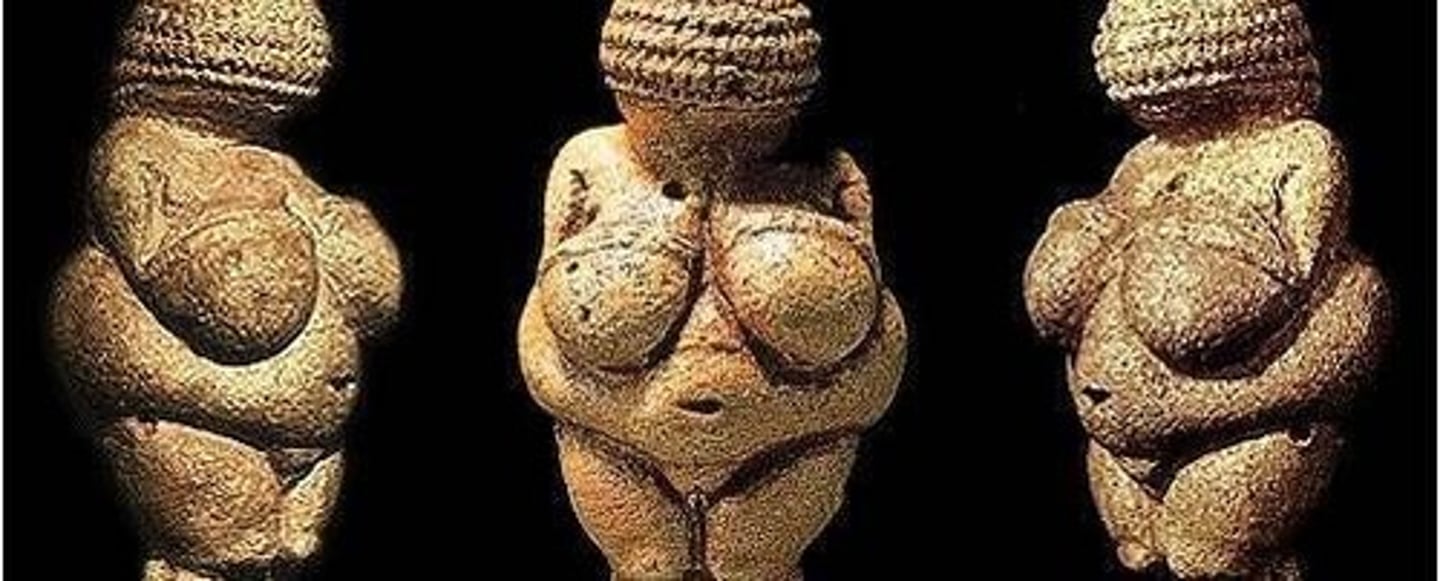
What is the Camelid Sacrum and its significance?
A bone sculpture shaped like a canine, linked to Mesoamerican burial and sacrificial rituals.
What is an anthropomorphic stele?
An upright stone slab resembling human form, used for religious burial purposes.
Describe the Jade cong from Liangzhu, China.
A jade object with a circular hole within a square, featuring abstract designs and mask-like images.
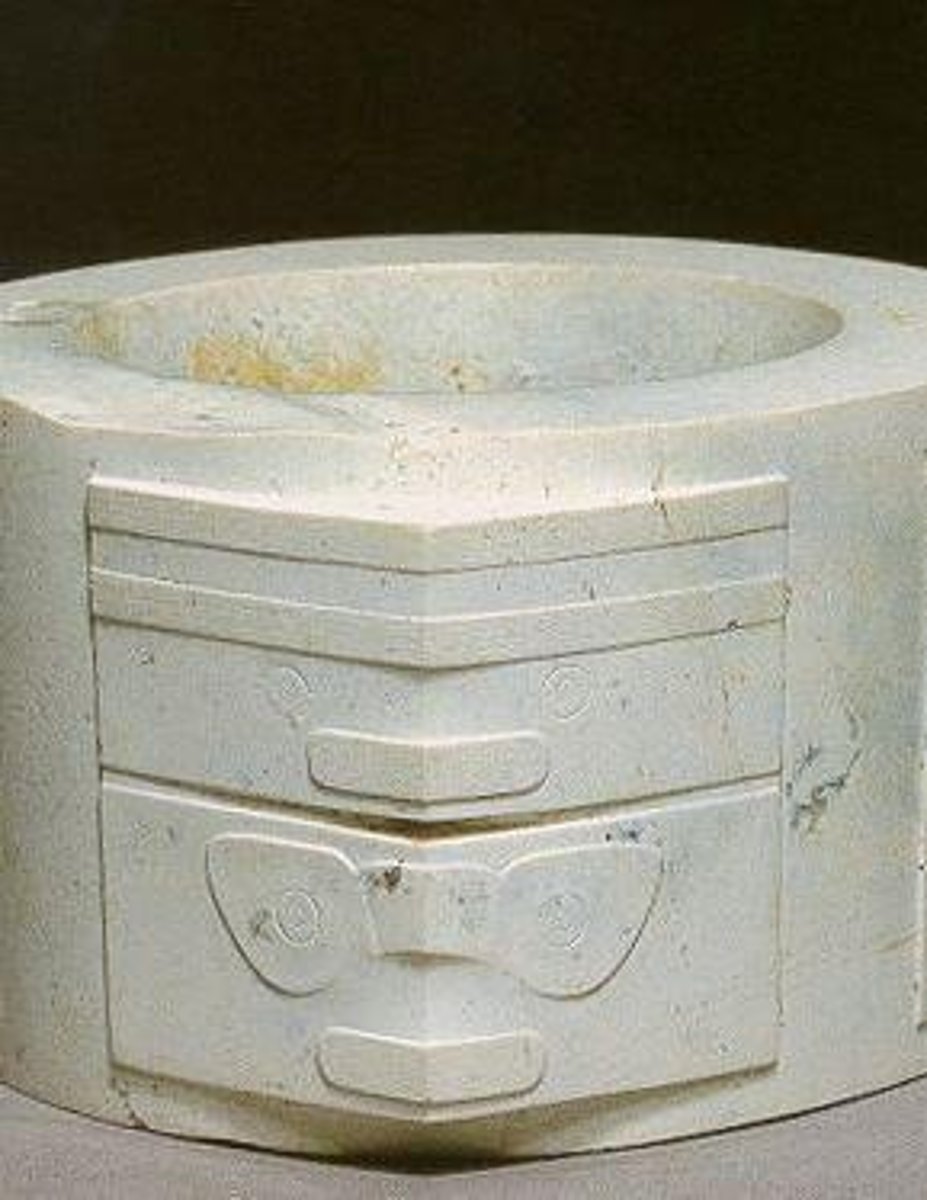
What is the Ambum Stone and its possible interpretations?
A composite human/animal figure, possibly representing a masked human or an anteater embryo.
What are the Tlatilco Female Figures known for?
Ceramic figures depicting elaborate hairstyles and body ornaments, some showing deformities.
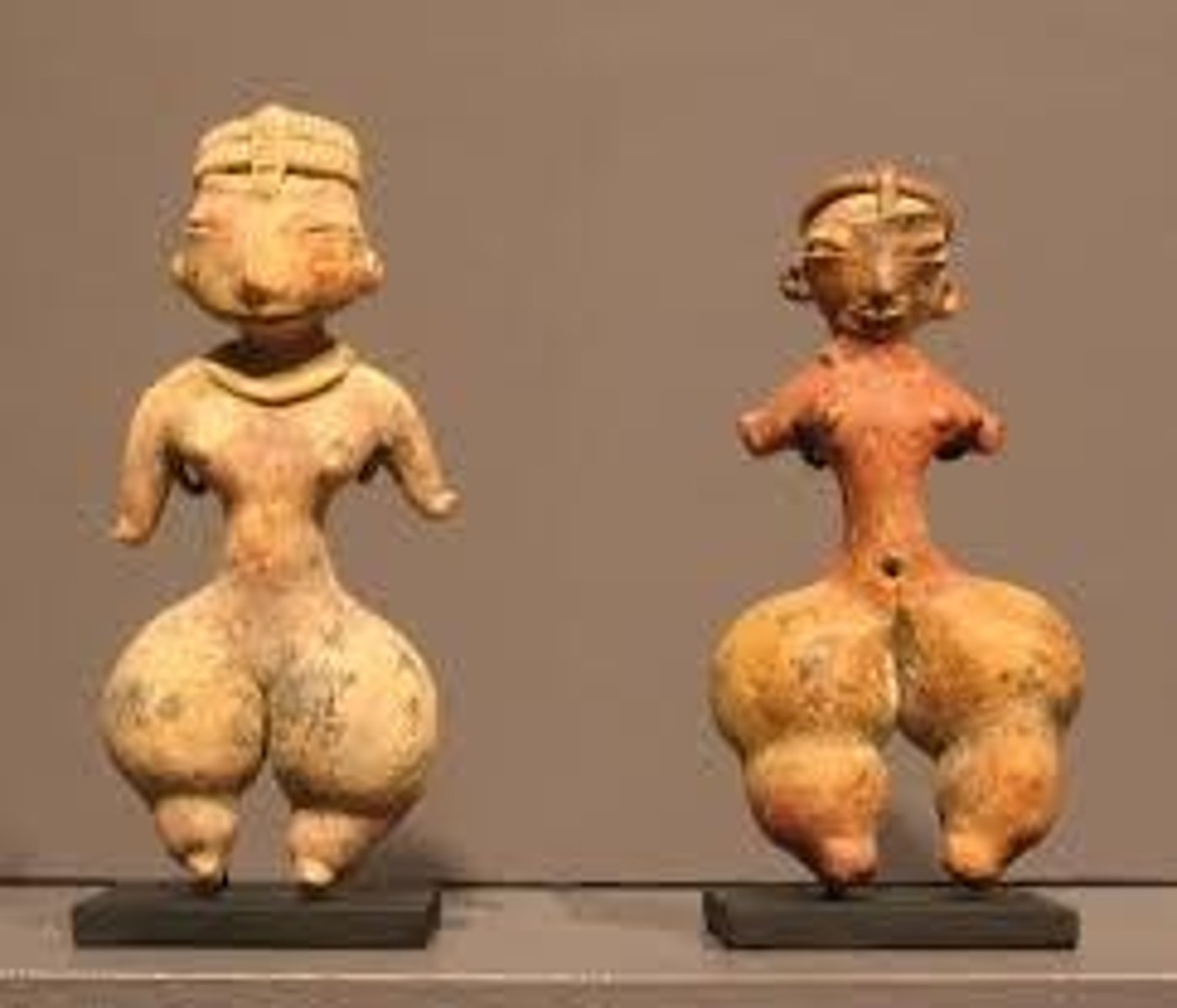
What is the significance of the Terra-cotta fragment from Lapita culture?
It features curved stamped patterns and is one of the oldest human faces in Oceanic art.
What characterizes prehistoric painting?
Images of animals with black outlines, often placed without relationship to one another.
How are animals and humans depicted in prehistoric art?
Animals are depicted realistically and three-dimensionally, while humans are shown as stick figures with little anatomical detail.
What does a negative handprint indicate in prehistoric art?
A negative handprint indicates that a hand was placed on the wall and paint was blown or splattered around it, leaving a silhouette.
What does the absence of certain fingers in handprints suggest?
It suggests that prehistoric people practiced voluntary mutilation, although the thumb, the most essential finger, is never harmed.
What is the significance of the Apollo 11 Stones?
They are some of the world's oldest works of art, dating back to c. 25,000-25,300 B.C.E., found in Wonderwerk Cave, Namibia.
What artistic technique is used in the Lascaux Caves?
Animals are rendered in 'twisted perspective,' where their bodies are shown in profile while their horns are viewed from a frontal perspective.
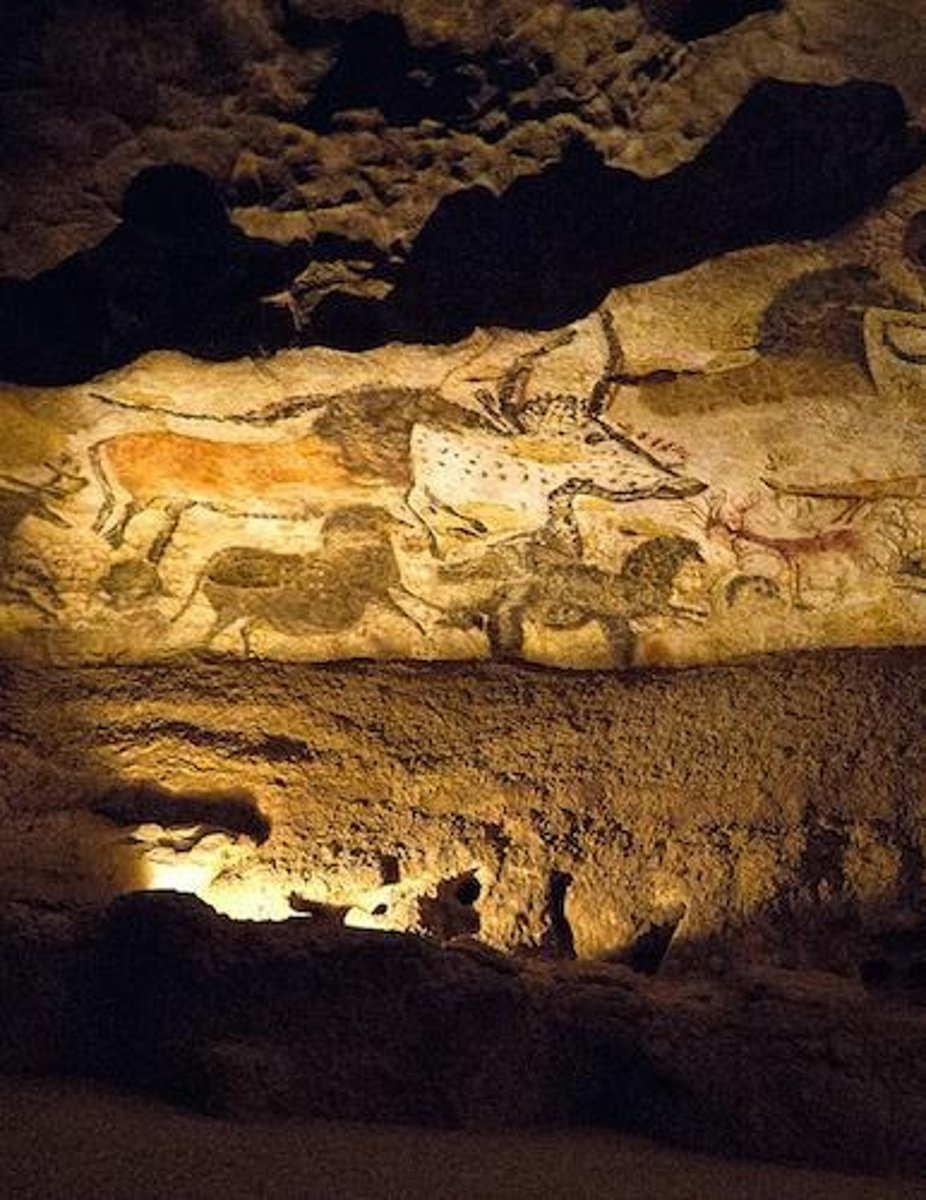
What materials were used to create the paintings in the Lascaux Caves?
Natural products such as charcoal, iron ore, and plants were used to make paint.
What is a possible purpose of the paintings in the Lascaux Caves?
They may have been used to ensure a successful hunt or express the importance of animals to human survival.
What does the Running Horned Woman painting depict?
It depicts livestock, wildlife, and humans, showcasing a composite view of the body and possibly symbolizing a ritual or dance.
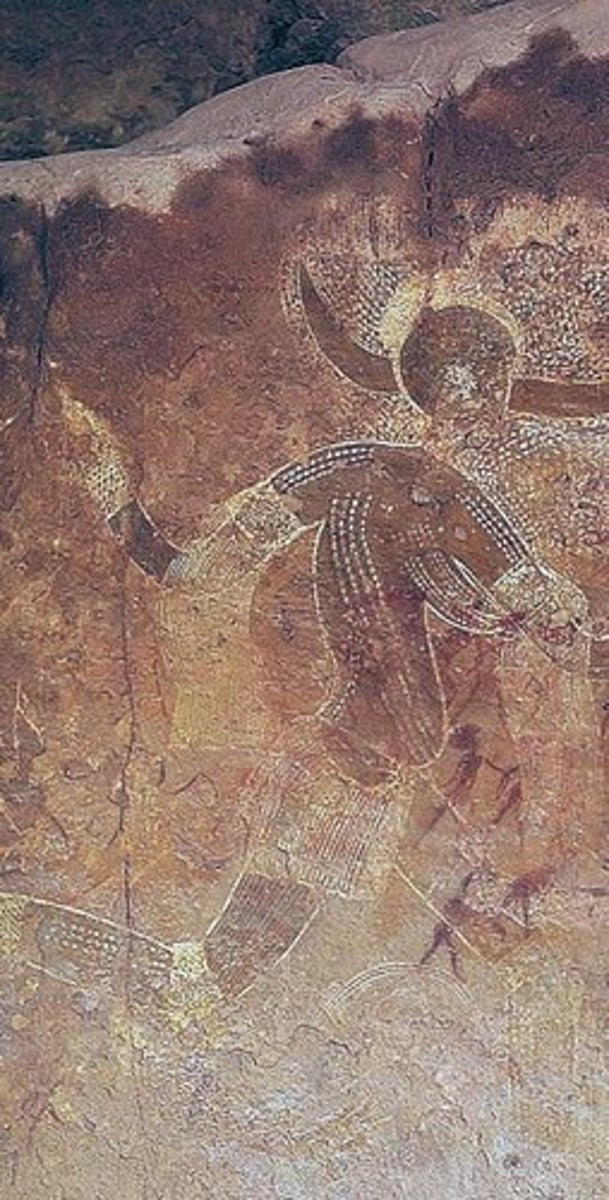
What is the significance of the Bushel with ibex motifs?
It is a funerary object found near a burial site, possibly identifying the deceased as belonging to a particular family or clan.
What architectural feature characterizes Stonehenge?
Stonehenge is characterized by a post and lintel structure.
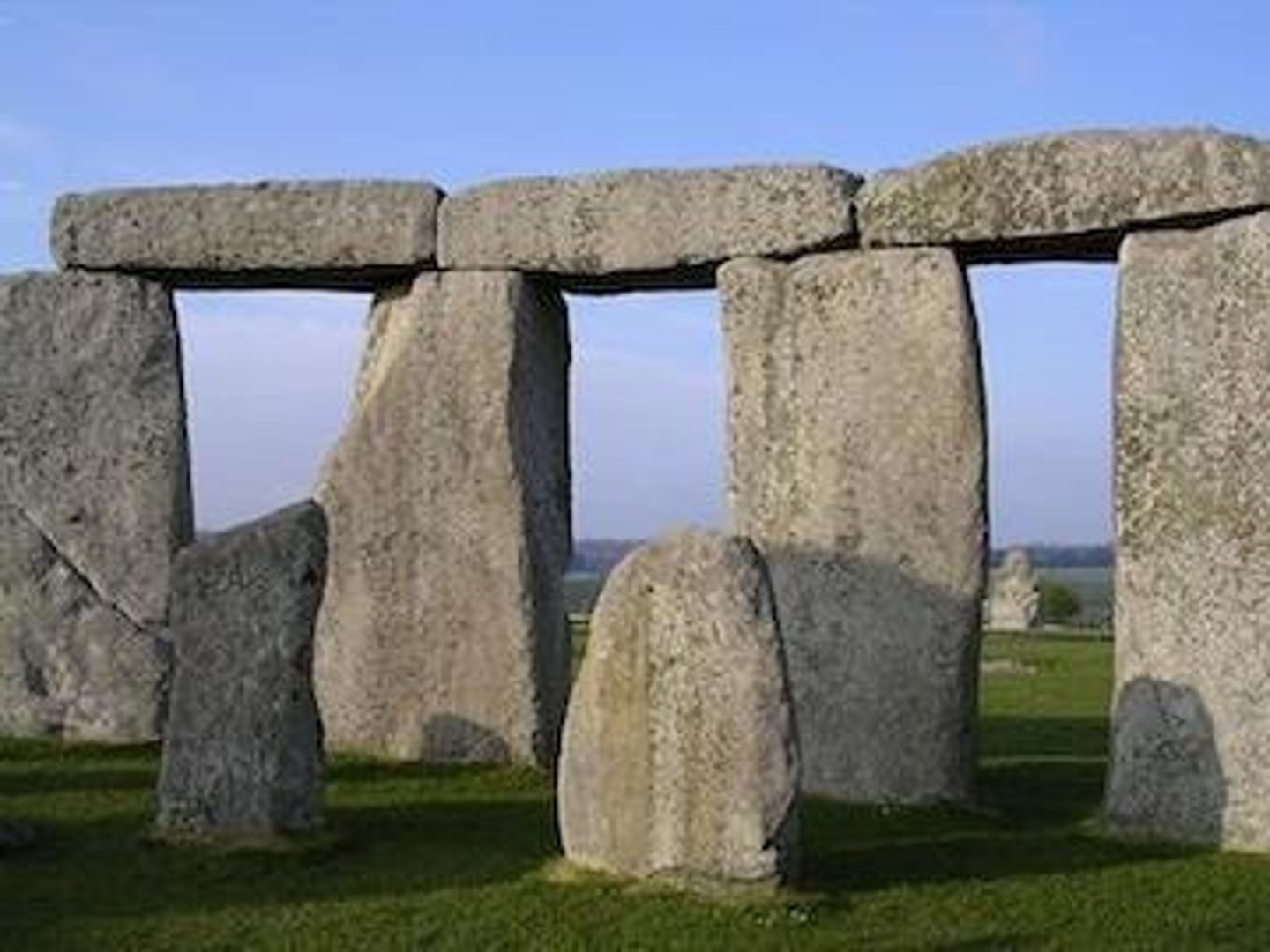
What does the analysis of bones found at Stonehenge reveal?
Most burials were of adult males aged 25-40 years in good health, suggesting elite status for those interred there.
What is the orientation of Stonehenge believed to be related to?
It is generally thought to be oriented toward sunrise on the longest day of the year and may also predict eclipses.
What is a henge in the context of prehistoric architecture?
A henge is a Neolithic monument characterized by a circular ground plan.
What is the time period of the Lascaux Caves paintings?
The paintings date back to 15,000-13,000 B.C.E.
What evidence suggests that the Lascaux Caves were not dwellings?
Prehistoric people led migratory lives, and there is evidence of scaffolding and that caves were used for shelter rather than as homes.
What is the significance of the location of the Running Horned Woman painting?
It was found on an isolated rock, suggesting it may have had a symbolic rather than a literal representation.
What technological advance is noted in the creation of the Bushel with ibex motifs?
The use of the potter's wheel is noted as a technological advance.
What is one theory regarding the purpose of the paintings in the Lascaux Caves?
One theory suggests they were created for shamanistic purposes, reflecting a belief in contacting nature's forces.
What is the estimated age range of the Running Horned Woman painting?
The painting dates back to 6,000-4,000 B.C.E.